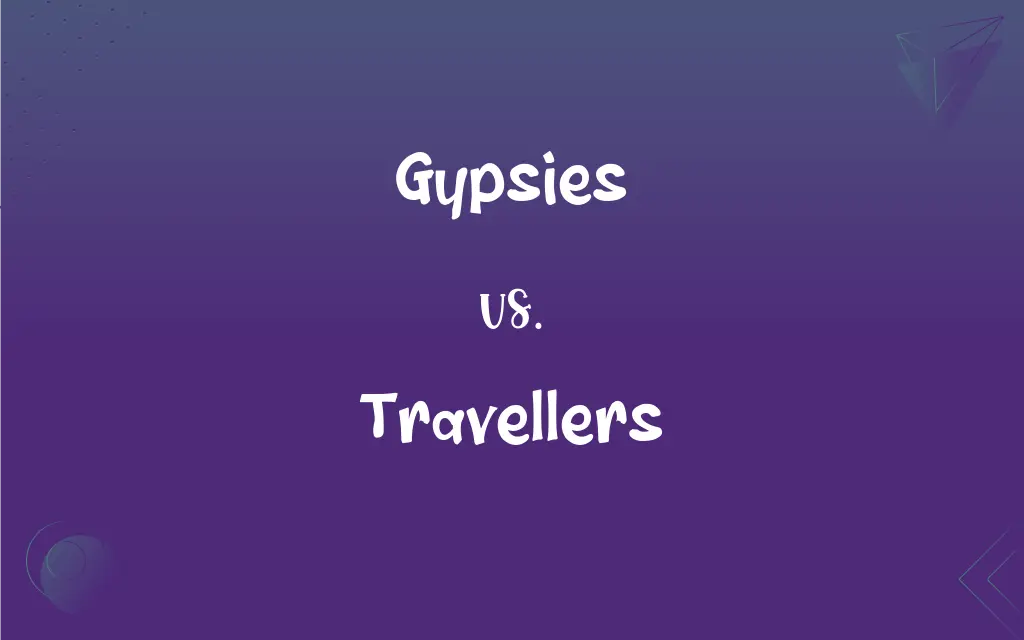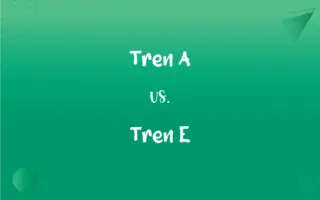Gypsies vs. Travellers: What's the Difference?
By Janet White & Harlon Moss || Published on April 12, 2024
Gypsies are ethnically distinct groups with origins in India, known for their nomadic lifestyle, while Travellers refer to various groups, including Irish Travellers, with a nomadic or semi-nomadic way of life not tied to a specific ethnicity.

Key Differences
Gypsies, particularly the Romani people, trace their origins back to northern India, migrating to Europe around a thousand years ago. Travellers, such as Irish Travellers, may not have a distant migratory history but share a nomadic tradition within specific regions, like Ireland or Britain.
The term "Gypsy" often specifically refers to the Romani people, known for their distinct language and culture developed over centuries of migration. Travellers encompass a broader category, including ethnic groups with a tradition of mobility, such as the Irish Travellers, who have their own unique languages and customs, like Shelta.
Discrimination and stereotyping are common issues faced by both Gypsies and Travellers, but their social and legal challenges can vary significantly by region and community. Gypsies' transnational history often subjects them to a unique set of prejudices across multiple countries, whereas Travellers might face discrimination more localized to their home regions.
Efforts to maintain cultural identity and traditions are central to both Gypsies and Travellers amidst modern pressures. Gypsies celebrate their heritage through music, dance, and oral traditions, while Travellers also preserve a rich cultural legacy, including storytelling and craftsmanship.
Legal recognition and rights vary widely for Gypsies and Travellers. In some countries, Gypsies are recognized as a national minority, which comes with certain legal protections, whereas Travellers’ recognition can depend on regional policies, affecting their access to education, healthcare, and housing.
ADVERTISEMENT
Comparison Chart
Origins
Northern India, around 1,000 years ago.
Various, including Ireland for Irish Travellers.
Culture
Distinct language (Romani) and nomadic lifestyle.
Distinct languages (e.g., Shelta) and traditions.
Discrimination
Faces prejudice across multiple countries.
Often faces localized discrimination.
Cultural Preservation
Music, dance, oral traditions.
Storytelling, craftsmanship, traditional roles.
Legal Recognition
Often recognized as a national minority.
Recognition varies, sometimes recognized regionally.
ADVERTISEMENT
Gypsies and Travellers Definitions
Gypsies
Ethnically distinct groups with nomadic traditions.
Gypsies have contributed richly to European music and culture.
Travellers
Irish Travellers are a distinct ethnic group in Ireland.
Irish Travellers have their own language, called Shelta.
Gypsies
The Romani, a major Gypsy group, originated from India.
Romani language contains words from ancient Indian dialects.
Travellers
Groups with a nomadic or semi-nomadic lifestyle.
Travellers often set up temporary camps on the outskirts of towns.
Gypsies
Face widespread discrimination yet maintain cultural pride.
Despite challenges, Gypsies celebrate their heritage annually.
Travellers
Maintain a strong sense of community and tradition.
Traveller weddings are large events, reflecting their rich traditions.
Gypsies
Known for their music, dance, and crafts.
Gypsy artisans often sell their work at local markets.
Travellers
Face social and legal challenges.
Travellers advocate for better access to education and healthcare.
Gypsies
See Romani.
Travellers
Crafts and trade are important to their economy.
Many Travellers are skilled in metalwork and horse trading.
Gypsies
The Romani language.
Travellers
One who travels or has traveled, as to distant places.
Gypsies
A member of any of various traditionally itinerant groups unrelated to the Romani.
Travellers
A traveling salesperson.
Gypsies
A part-time or temporary member of a college faculty.
Travellers
A member of any of various groups of traditionally itinerant people living especially in Scotland and Ireland.
Gypsies
A member of the chorus line in a theater production.
Travellers
A metal ring that moves freely back and forth on a rope, rod, or spar.
Gypsies
Plural of gypsy
Travellers
The rope, rod, or spar on which such a ring moves.
Gypsies
Plural of gypsie
Travellers
A carriage that slides on a transverse track near the stern of a sailboat, providing an adjustable point of attachment for the mainsheet block.
Gypsies
Often nomadic, traveling in caravans.
Gypsy families may move from place to place, following seasonal work.
Travellers
Plural of traveller
FAQs
What defines a Gypsy?
A Gypsy is part of ethnically distinct groups with origins in India, known for their nomadic lifestyle and cultural traditions.
How do Gypsies and Travellers differ in origin?
Gypsies originated from northern India, while Travellers' origins vary, with some groups like Irish Travellers originating from specific regions such as Ireland.
What challenges do Gypsies face?
Gypsies face discrimination, stereotyping, and challenges related to their nomadic lifestyle, including issues with housing and education.
What is the significance of language for Gypsies and Travellers?
Language plays a key role in identity for both groups, with Gypsies speaking Romani and Travellers having their languages, such as Shelta for Irish Travellers.
Who are Travellers?
Travellers refer to various groups, including Irish Travellers, known for their nomadic or semi-nomadic way of life, not necessarily tied to a specific ethnicity.
Can Travellers be considered Gypsies?
While some Travellers, like the Romani, are considered Gypsies, not all Travellers are Gypsies, as the term encompasses a broader range of nomadic groups.
What legal rights do Travellers have?
Travellers’ legal rights vary by region, with some areas recognizing them as ethnic minorities and providing certain protections.
What cultural practices do Gypsies have?
Gypsies have rich cultural practices, including music, dance, and oral storytelling, deeply influenced by their diverse migration history.
How do Irish Travellers preserve their heritage?
Through oral traditions, family roles, and maintaining a close-knit community structure that supports their cultural practices.
What is the significance of crafts in Traveller communities?
Crafts not only serve as a source of income but also as a means of preserving and passing down traditional skills.
What initiatives exist to support Gypsies and Travellers?
Various NGOs and community organizations work to advocate for their rights, improve living conditions, and promote social inclusion.
How do Gypsies and Travellers maintain their traditions?
Both communities maintain traditions through cultural practices like storytelling, music, and maintaining strong community bonds.
How do Gypsies and Travellers contribute to society?
They contribute through cultural diversity, artisan crafts, music, and enriching the social fabric of the societies they live in.
What is a common misconception about Travellers?
A common misconception is that all Travellers have a completely nomadic lifestyle, whereas many now have semi-nomadic or settled ways of life.
What role do music and dance play in Gypsy culture?
They are vital expressions of cultural identity and heritage, celebrated through festivals and family gatherings.
Are Gypsies and Travellers recognized internationally?
Recognition varies, with some international bodies advocating for their rights, but legal and social recognition is often country-specific.
Can Gypsies and Travellers own property?
Yes, many do own property, though their nomadic lifestyle may influence their relationship with property ownership.
How do education and healthcare challenges affect these communities?
Limited access and discrimination can lead to lower educational attainment and health disparities within these communities.
Why is discrimination a significant issue for both groups?
Discrimination affects their access to services, employment, and social inclusion, stemming from longstanding stereotypes and prejudices.
How do Gypsies and Travellers view education?
While valuing education, barriers and discrimination can affect their access and participation, with many communities advocating for better educational opportunities.
About Author
Written by
Janet WhiteJanet White has been an esteemed writer and blogger for Difference Wiki. Holding a Master's degree in Science and Medical Journalism from the prestigious Boston University, she has consistently demonstrated her expertise and passion for her field. When she's not immersed in her work, Janet relishes her time exercising, delving into a good book, and cherishing moments with friends and family.
Co-written by
Harlon MossHarlon is a seasoned quality moderator and accomplished content writer for Difference Wiki. An alumnus of the prestigious University of California, he earned his degree in Computer Science. Leveraging his academic background, Harlon brings a meticulous and informed perspective to his work, ensuring content accuracy and excellence.































































